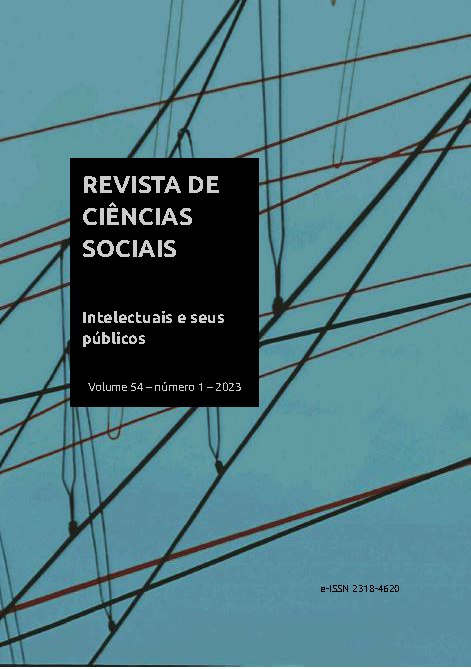Internationalization of Brazilian Higher Education
Perspectives of the border universities
DOI:
https://doi.org/10.36517/rcs.54.1.a01Keywords:
Internationalization, Higher Education, Borders, Sustainable InternationalizationAbstract
Internationalization of Higher Education is a prominent theme within Higher Education Institutions globally. Its origin is intertwined with the neoliberal agenda leveraged at the end of the Cold War, the article studies the concept of internationalization by answering the questions, what is it, why to do it and how? It appears that the mainstream of internationalization strictly links to mobility; however, it is a complex and multifaceted process, as well as the educational process itself. After a brief introduction, is presented the methodology used, followed by an analysis of the theoretical framework, describing the origin and analysing internationalization from a political, economic and social/cultural perspective. At the sequence, a research carried out in 2019 with the mapping of border universities is presented, based on primary data and structured interviews, as well as some open interviews conducted with managers of border university international relations offices. We describe the potential of internationalization of these institutions, in a model focused on regional development, meeting the social demands of the territory. Finally, are inferred some perspectives for sustainable internationalization.
Deprecated: rtrim(): Passing null to parameter #1 ($string) of type string is deprecated in /var/ojs/html/plugins/generic/piwik/PiwikPlugin.inc.php on line 113
Downloads
References
BAUMGRATZ, Deise, et al. UNIVERSIDADES DE FRONTEIRA: Um estudo sobre o perfil institucional e as necessidades das Instituições de Ensino Superior em áreas de fronteira no Brasil. UNILA: Foz do Iguaçu, 2019. Disponível em: <http://dspace.unila.edu.br/123456789/4879> acesso em 04 jun. 2020.
BRASIL. Constituição (1988). Constituição da República Federativa do Brasil. Brasília, DF: Senado Federal: Centro Gráfico, 1988. 292 p.
CASTRO, Paloma; LUNDGREN. Ulla; Woodin, Jane. Intercultural Dialogue: an educational approach. In: Educational Approaches to Internationalization through Intercultural Dialogue: Reflections on Theory and Practice. Routledge: London, 2020. https://doi.org/10.4324/9780429444289.
CORDEIRO, Maria Helena B. V. Entrevista concedida a Deise Baumgratz e Diana Araujo Pereira. UNILA, Chapecó, dez. 2018.
DAHLEM, Roseli B. Entrevista concedida a Deise Baumgratz e Diana Araujo Pereira. UNILA, Foz do Iguaçu, ago. 2018.
MARMOLEJO, Francisco. Global Community Engagement – Francisco Marmolejo. In: Conferência Faubai 2019, Belém-PA. Abril, 2019.
MESTENHAUSER, Josef A. Missing In Action: Leadership for International and Global Education for the Twenty-First Century. In
MÉSZÁROS, István. Educação para além do capital. 2.ª ed. São Paulo: Boitempo, 2008. Internationalization of Higher Education, an institutional perspective. UNESCO. 2000, p. 23 – 62. Disponível em: < https://unesdoc.unesco.org/in/documentViewer.xhtml?v=2.1.196&id=p::usmarcdef_0000122253&file=/in/rest/annotationSVC/DownloadWatermarkedAttachment/attach_import_da9b4d74-d316-44b5-b637-a232b09ee542%3F_%3D122253engo.pdf&updateUrl=updateUrl5863&ark=/ark:/48223/pf0000122253/PDF/122253engo.pdf.multi&fullScreen=true&locale=en#%5B%7B%22num%22%3A36%2C%22gen%22%3A0%7D%2C%7B%22name%22%3A%22XYZ%22%7D%2C0%2C564%2Cnull%5D>. Acesso em: 04 jun. 2020.
KNIGHT, J.; DE WIT, H. Internationalization of Higher Education in Asia Pacific Countries. Amsterdam: European Association for International Education, 1997.
PEGO. Bolívar (coord.) et al. Fronteiras do Brasil: diagnóstico e agenda de pesquisa para política pública. IPEA: Vol. 2. Brasília, 2017. ISBN: 978-85-781 1 -303-2.
ROCHA. Rafael. Entrevista concedida a Deise Baumgratz e Diana Araujo Pereira. UNILA, dez. 2018.
SANTOS, Boaventura de Souza. As dores que ficam são as liberdades que faltam. Para continuar e aprofundar o Manifesto de 1918. In: Conferência Regional de Educação Superior (CRES), 2018. Córdoba, Argentina. Jun. 2018
WIT, Hans de. Changing Rationales For The Internationalization of Higher Education. In: Internationalization of Higher Education, an institutional perspective. UNESCO. 2000, p. 9 - 21. Disponível em: < https://unesdoc.unesco.org/in/documentViewer.xhtml?v=2.1.196&id=p::usmarcdef_0000122253&file=/in/rest/annotationSVC/DownloadWatermarkedAttachment/attach_import_da9b4d74-d316-44b5-b637-a232b09ee542%3F_%3D122253engo.pdf&updateUrl=updateUrl5863&ark=/ark:/48223/pf0000122253/PDF/122253engo.pdf.multi&fullScreen=true&locale=en#%5B%7B%22num%22%3A36%2C%22gen%22%3A0%7D%2C%7B%22name%22%3A%22XYZ%22%7D%2C0%2C564%2Cnull%5D>. Acesso em: 04 jun. 2020.
Downloads
Published
How to Cite
Issue
Section
License
Autores que publicam nesta revista concordam com os seguintes termos:- Autores mantém os direitos autorais e concedem à revista o direito de primeira publicação, com o trabalho simultaneamente licenciado sob a Creative Commons Attribution License, que permite o compartilhamento do trabalho com reconhecimento da autoria do trabalho e publicação inicial nesta revista.
- Autores têm autorização para assumir contratos adicionais separadamente, para distribuição não-exclusiva da versão do trabalho publicada nesta revista (ex.: publicar em repositório institucional ou como capítulo de livro), com reconhecimento de autoria e publicação inicial nesta revista.
- Autores têm permissão e são estimulados a publicar e distribuir seu trabalho online (ex.: em repositórios institucionais ou na sua página pessoal) a qualquer ponto antes ou durante o processo editorial, já que isso pode gerar alterações produtivas, bem como aumentar o impacto e a citação do trabalho publicado (Veja O Efeito do Acesso Livre).
Deprecated: json_decode(): Passing null to parameter #1 ($json) of type string is deprecated in /var/ojs/html/plugins/generic/citations/CitationsPlugin.inc.php on line 49



